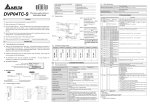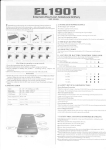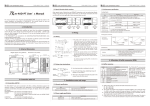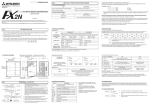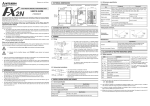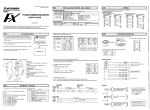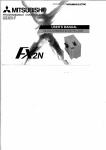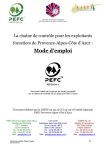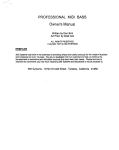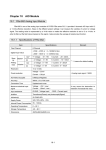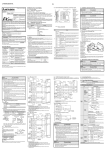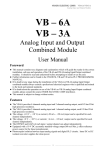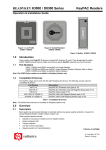Download fx-2da user manual
Transcript
ADVANCED AND EVER ADVANCING MITSUBISHI ELECTRIC PROGRAMMABLE CONTROLLERS SER'S MANUAL r - % .. 5." *+*% 8 s ..-... -..--- .*" " ' .-., , y....r. "...."lit" u t :"3 ~ f . ~ u l l w a lJeLLlIlgs G by the TO instruction of the base unit. sion unit. 1 Gain and offset can be adjusted using the procedure described on pages 13 ro 15. Foreword This manual provides technical information on the use of the FX-2DA Analog Output Block in connection with the FX programmable controller. Users should ensure that the details of this manual are studied and understood before attempting to install or use these units. CONTENTS 1. INTRODUCTION 2. OUTLINE SPECIFICATION 3. WIRING 4. ASSIGNMENT OF BUFFER MEMORY (BFM) 5. STATUS INFORMATION 6. EXAMPLE PROGRAMS 7. GAIN AND OFFSET ADJUSTMENT 8. FROMITO COMMANDS 9. REFERENCE 10. APPENDIX 1. INTRODUCTION The FX-2DA analog output unit receives up to 2 channels of 12-bit digital data stored in 16-bit words from an FX series programmable controller and converts it into 2 channels of analog output (either voltage or current). Optical coupling is used to ensure that voltage surges do not damage other parts of your equipment. (1) Compatible Programmable Controllers The FROM-TO command is used for transferring data tolfrom the prograrnmable controller, so versions 2.0 or subsequent versions of the FX series programmable controllers (those with serial no. 13XXXX or larger) are required. (3) Analog Output Range The preset ranges -10V to + 10V and +4mA to +20mA can be selected individually for each channel. Current or voltage selection is made by buffer mernory assignment and terminal wiring. (4) Gain and Offset (2) Configuration Specifications The FX-2DA occupies 8 110 points but does not affect the addressing of normal input and output relays. It is important only when maximum I10 is considered. The FX-2DA draws 30mA from the 5V rail from the base or extension unit. Gain and offset can be adjusted by the user to give the desired output range. The desired range must be within the convertable maximum of the unit. Adjustment can be made by the front panel switches or by software settings by the TO instruction of the base unit. 2. OUTLINE SPECIFICATION (1) Dimension mm (inch) Weight: Approx. 0.5 kg (1.1 Ibs.) Accessories: Self- adhesive labels for special block number identification 2. OUTLINE SPECIFICATION (2) Perfomance Specifications The environmental specifications for the FX-2DA are the same as those for your base unit. Gain and offset can be adjusted using the procedure described on pages 13 to 15. 9 3. WIRING Programmable controller Extension cable *2 *I Use a twisted pair shielded cable for the analog *4 Connect the ground terminal on the FX-2DA output. This cable should be wired away from with the ground terminal on the base unit of the power lines or any other lines which could inprogrammable controller. Use class 3 groundduce noise. ing on the base unit, if available. * 2 Apply 1-point grounding at the load side of the Caution: output cable (class 3 grounding: 100Q or less). l drive current If electrical noise is caused from grounding, dis- (a) 'l%esame output ~ h a n n ecannot and voltage output loads at the same time! connect from ground. *3 If electrical noise or a voltage ripple exists at the (b) Shorting the voltage output terminals may damage the unit! output, connect a smoothing capacitor of 0.1 to 0.47,uF, 25V. 3. WIRING (1) Using crimp terminations * Use only crimp terminations of the type indicated in the figure 6.8(0.27") or less at left. For M3.5(0.14in.) and 8kg.cm. 1 6.8(0-27''' or less (2) * Secure the termination using a tightening torque of between 5 * Only use the terminations indicated at left. Use with other special blocks The FROM and TO commands are also used by other Special Function Blocks, (e.g. the analog input blocks, high-speed counter blocks, pulse output blocks, etc.). These may be connected directly t o the FX Programmable Controller's extension port or to any other extension unit's right side extension port. Each special unit or block is consecutively numbered from 0 to 7 beginning from the one closest to the base unit. A maximum of eight special blocks can be connected to one base unit. FX-48MR XO-X27 YO-Y27 FX-4AD Special block No.0 FX8EX X30X37 FX-2DA Special block No.1 FX-32ER X40-X57 Y30-Y47 FX-PAD-PT Specla1 block No.2 ASSIGNMENT OF BLlFFER MEMORY (BFM) Data transfer between the FX-2DA analog output "nit and the programmable controller is through the FX-2DA's RAM buffer memory (32 addresses each of 16 bits). (1) . . BFM Contents NO. #O Analog output mode (currentlvoltage) default = (HOO) * #I Output data CHI 'f2 Output data CH2 #3 Reserved - #4 : * #5 *#6 to #lQ Reserved last data reset default = HOO Reserved In BFM's (buffer memory) with an "*", data can be written from programmable controller using the TO command. These BFM's should always be given when the programmable controller goes from STOP to RUN. Buffer memory (BFMs) are reset t o their default settings upon power on. 1. Switching between voltage and current Output modes. The value-0fBFM #O switches the analog output between voltage and current on channels CHI and CH2. It takes the form of a 2-character HEX number. The least significant character controls CHI and the other controls CH2. Control of each 0 HEX character of HOO: 0 = 0 : Voltage output (-10V to + 10V) 0 = 1 : Current output ( + 4mA to + 20mA) Example : H I 0 CHI : Voltage output, CH2: Current output 2. Output data: BFM #1 : CHI data (default =0) BFM #2 : CH2 data (default = 0) 3. If the programmable controller is changed to the STOP state, the FX-2DA will continue t o output the last value. To reset the output to the offset value, set the HEX characters of BFM #5 to one of the appropriate settings below: H01 : CH2 = Hold, CHI =Reset H I 0 : CH2 = Reset, CHI = Hold H11 : CH2 = Reset, CHI = Reset Both channels are held when BFM #5 = HOO. 4. ASSIGNMENT OF BUFFER MEMORY (BFM) The buffer memory also handles information used to adjust the gain and offsets of the FX-2DA unit. Status of the unit such as errors are also available. In "*" marked BFM's, data can be written from the programmable controller via the TO command. From BFM #29 and #30, data can be read via the FROM command. a Offset value: the actual output value when the digital input is 0. a Gain value: the actual output value when the digital input is + 1000. 4. ASSIGNMENT OF BUFFER MEMORY (BFM) 1. When BFM #20 is set to K1, all settings in the buffer memory are reset to their default settings. This allows the buffer memory settings to be set from the beginnivg again when many settings have been corrupted. 2. If (b1,bO) of BFM #21 is set to (1,0), gain and offset adjustments are prohibited. This is to prevent inadvertent misuse by the operator. To adjust the gain and offset, (b1,bO) of BFM #21 must have the values (0,l). The default is set at (0,l). 3. Each time a TO instruction is used to send data to BFM #22 (gainloffset setting command), the designated gain and offsets of each channel (G202 G101) are adjusted with the values in BFM #23 and #24. This action causes the adjustments t o be written to internal non-volatile EEPROM memory. Limit this action to as little as possible to preserve the life of the EEPROM memory. 4. Gain and offset values in BFM #23 and #24 are set in units of mV or PA. Due to the resolution of the unit, the actual re sponse will be in steps of 5mV or 20pA. Caution Because of the time taken to wriie to the EEPROM memory, a delay of 300ms is needed between instructions that cause a write to the EEPROM. Therefore, a delay timer should be used before further writes to the EEPROM, after executing the following: Writing to BFM #0, #5 or #21. The gainloffset command with BFM #22. The default command with BFM #20. 5. STATUS INFORMATION (1) Status information BFM #29 (2) Model code number BFM #30 The ldentification code for a Special Block is read using the FROM command. The ldentification code for the FX-2AD unit is K3010. The programmable controller can use this facility in the program to identify the special block before commencing any data transfer from and to the special block. Caution adjust prohibit BFMXPl is Set at (0,l) Bits b5 to b7,b9, b l 1, and b13 are undefined. Values of BFM #0, #5, #23 and #24 are copied to EEPROM memory of the FX-2DA. BFM #21 and #22 are only copied when data is sent to gainloffset command BFM #22. BFM #20 also writes to the EEPROM memory. The EEPROM has a life of about 10,000 cycles (changes), so please do not use programs which frequently change these BFMs. Example #1 If the gain and offset settings are left at their default values, and the status information is ignored, you can use the simple program which follows. KO 1 pulse Block No. No.1 HID I I BFM #O Voltage output on both CHI and CH2 KI J I Transfer Number of data HlO words W~hdpAUdt~bCHlirtolhrdda~W. WnbIlma~'qut~lo~Molhrbta~D1. K1 DO K2 Range: -2048 to +2047 (DO) BFM #1 (Output to CHI) (Dl) BFM #2 (Output to CH2) monltor Procedure 1. Write the program into the programmable controller. 2. Connect the FX-2DA unit to the base unit of the programmable controller as the 2nd special block. 3. Set the MODE switch on the FX-2DA panel to READY. 4. Turn on the programmable controller and the FX-2DA unit. Result : When the programmable controller is in RUN mode, the voltage output on channels CHI and CH2 will vary according to the digital values in data registers DO and D l . When the programmable controller is in STOP mode the last output made during RUN mode will be maintained. In the above program the FX-2DA unit occupies the position of special block No.1 (that is the 2nd closest special block to the base unit). Voltage output from -10V to + 10V is produced from channel CHI and + 4mA to + 20mA from CH2. 6. EXAMPLE PROGRAMS Example #2 In the following example, channel CHI is set to voltage output, while CH2 is set to current output. The FX-2DA unit is connected at the position of special block No.1. If the programmable controller is changed to the STOP mode, the last data sent will remain and the outputs will hold. FNC 78 FROM 1 monitor K, U30 02 K1 1 Block No. 1, BFM #30 (Identification code) Transfer to D2. When Identification code is K3010 (FX9DA), M I becomes ON. FNC 7s TO K1 KO nr D KI Block No.1 BFM XO Transfer data H I 0 Number of words HlO+unit No. 1 BFM #O CHI: voltage output, CH2: current output (DO)+BFM #1 (output to CHI) (Dl)-*BFM #2 (output to CH2) BFM #29 (b15 to bO)+(M25 to M10) Reads the status information. ... . - IY Al No error A+, , I - 'READY' O u t ~ u tranae normal Output data normal 6. EXAMPLE PROGRAMS (1) Operation (2) Abnormality check extended cable for the FX-2DA are properly connected. The following can be checked with LEDs located on the main panel of the FX-2DA. POWER LED 2) 5V, 30mA is supplied from the base and extension units for the FX-2DA. Check that power overload is not caused by this or any other special block. Lights up when 5V power is supplied from the programmable controller. If not, check if the extension cable is properly connected. 24V LED 3) When DC 24V power is supplied from the Lights up when DC 24V power is supplied to the terminal of the FX-2DA. If DC 24V +/10% is supplied but this does not light up, failure may have occurred on the base unit. D-A LED 1) Check if the output wiring, power wiring, and base and extension units of the programmable controller, check that the current is below the allowable service current on the programmable controller side (varies according to the number of extension blocks connected). 4) Set the MODE switch on the FX-2DA to the "READY" position, and turn the DC 24V power on. 5) Turn the programmable controller and RUN input ON. However, output mode of BFM #O should be set in advance depending on voltagelcurrent output. Lights up when Digital to Analog conversion is executing normally. It goes off if b l to b4 of buffer memory #29 is generated ON for all the channels. 7. GAIN AND OFFSET ADJUSTMENT (1) Standard characteristics of voltage output I + 10.235 +'OV" Analog output - Ga~n -10.24V (2) / .,-------- Digital output + 2047 - Standard characteristics of current output I Analog output Offset The solid lines show the I10 characteristics when the gain and offsets are left at their default settings. The dashed lines show examples of adjustments to the gain and offsets. Voltage or current output selection is set through the output wiring, and by a command from the programmable controller. Gain and offset settings will remain even after power OFF. Offset value: the analog output when the digital input is 0. Gain value: the analog output when digital input is + 1000. When the gain value is small (implying a steep slope), a small change in analog input will produce a large change in digital output. \ +4mA .' 0 ,- o Digital output - 1- + 1000 When the gain value is large (implying a gentle slope), a large change in analog input will only produce a small change in digital output. 7. GAlN AND OFFSET ADJUSTMENT (3) Gain and Offset Adjustment Using Switches on the FX-2DA Unit The gain and offsets can be adjusted by using the switches on the FX-2DA panel with the aid of a voltmeter and an ammeter which are to be connected to the FX-2DA. With these procedures you still need to set the input mode BFM #O. 5 Press the OFFSET button once with a ball point pen. The D-A LED lights up. The present offset value (voltage or current) is output. Use the UP,DOWN switch to reach the desired OFFSET value. (ranae: -5V to + 5V . or -20mA to +20mA) w After (bl, bO) of BFM #21 is changed to (1,0), you Can no longer change the gainloffsets' therefore write (0,1) to ( b l ,bO) of BFM #21 prior to adjusting the gainloffset settings. (Note: (0.1) is the default value) 1 Turn on DC 24V power of the FX-2DA. The 24V LED lights up. 2 3 4 7 Press the GAIN button once with a ball point pen. The offset value is read and the value is output. 8 Use the UPIDOWN switch to reach the desired GAlN value. range: Gain value - offset value = 1V to 15V (voltage output) = 4mA to 32mA (current output) Turn on the FX series programmable controller connected with the FX-2DA. The POWER LED lights up. (The programmable controller should be in STOP mode.) 9 Connect the load and voltmeter or ammeter to the CHI terminal. (between V+ and V- terminals for voltage output, and between I + and I-terminals for current output) 10 Repeat steps 3 to 9 for CH2 (if desired), then set the MODE switch to READY. Adjustment Set the MODE switch to CHI. . ~ ~ - Set the MODE switch to the READY ~osition. ~. The gain value is read, the^-A LED goes off, and the offset value is output. ~ is completed. 7. GAIN AND OFFSET ADJUSTMENT (4) ADJUSTMENT BY PROGRAMMABLE CONTROLLER I10 characteristics of the FX-2DA can be adjusted by changing the gain and offset parameters. 'These can be changed by the switches of the FX-2DA with the aid of Voltage & Current meters or simply changed by writting these settings from the programmable controller. The following is an example, changing the offset value to OmA and gain value to 20mA on output channel CH2 of the FX-2DA connected as block No.1. In the program shown at left, the programmable controller should be in RUN status, and MODE switch of the FX-2DA in the READY position. BFM #O should be of HEX value H10, and (b1,bO) of BFM #21 should be (0,l). HlO-BFM#O Pulse TO Kl+BFM X21 FNC79 K23 K1 KO This statement may be omitted BFM -'#23 is already at its defautt value. if K1 KO- BFM #23 (offset) I I I . . I I I I K20000- BFM Y 24 (gain) FNC79 TO (PI K1 K22 HC K1 HC+BFM X22 (offsetlgain set) 8. FROMITO COMMANDS (4) FROMITO Commands Explained FROM m l: rn2: [D .] : n: ml m2 [D.] n K1 K30 DO K1 Special unit or block No. (KO to K7 starting from the one closest to the base unit) Head address of buffer memory (n2 = KO to K31) Head address of the transfer destination. T, C, D, KnM, KnY, KnS, V and Z can be specified and element No. can be coupled with an index. Number of transfer points (K1 to K32 but K1 to K16 for DFROM, DFROMP.) ml - rnl ,m2 ,n: . BFM #30 in special block No.0 is transferred to DO. TO KI m2 [S'] D2 n _ D3, D2 are transferred to special block No.1 t~ BFM #2, #l. The same as above Head device no. of source. T, C, D, KnX, KnM, KnY, YnS, V, 2,K, [S.]: and H can be specified, and element No. can be coupled with an index. When XI0 or X I 1 is OFF, transfer is not executed, and data at the transfer destination is not changed. 9. REFERENCE - 5~ bower 1 Command in- formation EEPROM memory for offset and gain 3 , Buffer Memory Itatus read ~nputparameter settings I I I FX ~erles FROM I CPU FX-2DA Analog Oulput Block 17 7 3 MODE OFF-SET QA'N witch ~ w i l c h cwltch UPIDOWN &tch 10. APPENDIX ATTENTION FOR WHEN SWITCHING SYSTEM ON/OFF Due to the inevitable timing difference of the DC24v for the analog circuits and other power lines of the base unit, the output of the analog output Mock may behave erroneously before settling down to operational conditions in approximately 1sec. Therefore, ensure that this behavior is taken into account such that the end performance of the system is not degraded. power switch (example) cut analog lines before switching - r--1 DC24V supply FX-2DA -Analog output block -1 I I I I L - - A External analog machine MEMO Revisions EDITION DATE Jun. 1991 Aug. 1991 Nov. 1992 MANUAL NUMBER REVISION JY992D28301 A First edition JY992D28301 B P.18 "ATTENTION FOR WHEN SWITCHING SYSTEM ON I OFF" added. JY992D28301 C Diagram corrections : Page 4 Text corrections : Pages 6,9,14 EEPROM CAUTION : Page 8 Under no circumstances will Mitsubishi Electric be liable or responsible for any consequential damage that may arise as a result of the installation or use of this equipment. All examples and diagrams shown in this manual are intended only as an aid to understanding the text, not to guarantee operation. Mitsubishi Electric will accept no responsibility for actual use of the product based on these illustrative examples. Owing to the very great variety in possible applications of this equipment, you must satisfy yourself as to its suitability for your specific application. A MITSUBISHI ELECTRIC CORPORATION HEAD OFME: MITSUBISHI DENKI BUXj MARUNOWHI TOKYO 100 TELEX: J24532 CABLE MELCO TOKYO HlMEJl WORKS: 840. CHIVODA CHO. HIMEJI. JAPAN JY992D28301C HI-IB-059-C (9211) (SEN) @ Effective NOV. 1992 Specifications are subject to change without notice.

























